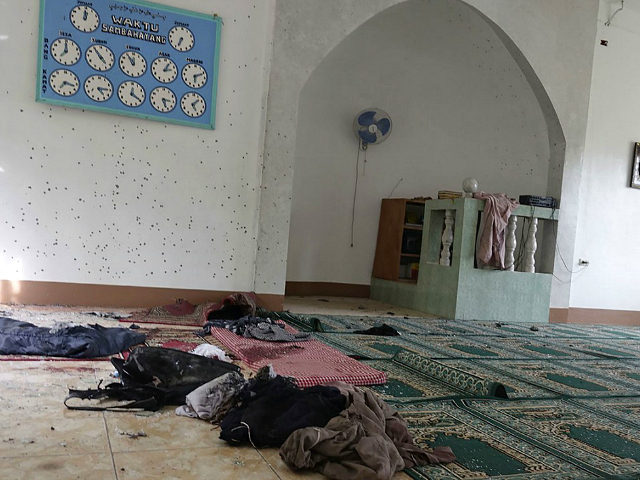A grenade was thrown into a mosque in the southern Philippines early Wednesday morning, killing two Muslim clerics. Four people were reportedly wounded in the blast. The mosque attack came three days after multiple bombs were detonated at a Catholic cathedral in the same region, killing 21 people.
According to the Associated Press, the victims were instructors who came to the mosque from surrounding provinces to teach Islam to children. They were sleeping in the mosque at the time of the attack. Philippine media reports describe them as members of Tablig, a Muslim missionary order.
Philippine Defense Secretary Delfin Lorenzana said on Wednesday that the mosque attack did not appear directly related to the church bombing claimed by the Islamic State but stressed the investigation is still ongoing.
Lorenzana specifically addressed speculation that the grenade attack on the mosque was meant as retaliation for the church bombing.
“The president has said in Jolo that the Christians and Muslims have been coexisting for a hundred years and there have never been revenge attacks,” he said, referring to the island where the Catholic church is located.
The president of the Philippines, Rodrigo Duterte, made waves on Tuesday by citing intelligence reports that portrayed the Catholic church attack as a suicide bombing, contradicting police officials who said the attackers detonated their bombs remotely and did not die in the assault. The Philippine military has also quoted eyewitness accounts that one of the bombers, a woman who planted the device which detonated inside the church, was seen leaving before the blast.
The Philippine Star noted that theories of a revenge bombing were fueled by the fact that Duterte’s remarks about suicide bombers came only a few hours before the grenade attack on the mosque.
There is also a widespread assumption that both bombings are related to the January 21 referendum to establish an autonomous region in the Muslim-majority southern Philippines.
President Duterte publicly ordered the military on Monday to eradicate Abu Sayyaf, a vicious terrorist gang allied with ISIS and rivals to the somewhat less vicious extremist group that will administer the new autonomous region. Airstrikes against Abu Sayyaf positions on Jolo island were reportedly conducted on Tuesday. Jolo, which has a history of dealing with hardline Islamist extremism, is the only region of the southern Philippines that voted against the autonomous region.
Local authorities called for calm as news of the mosque attack spread. “We must stand united against the terrorists who would divide us and, thus, destroy all that we are working to build and establish in our communities. We call on people of all faiths to come together to pray for peace,” local governor Mujiv Hataman said.
“Regardless of one’s faith, we must resist becoming a victim of this vicious cycle of violence these terrorists are now attempting to create,” politician Zia Alonto Adiong urged. “Let us not fall into their trap and give them the satisfaction of turning ourselves into enemies.”

COMMENTS
Please let us know if you're having issues with commenting.